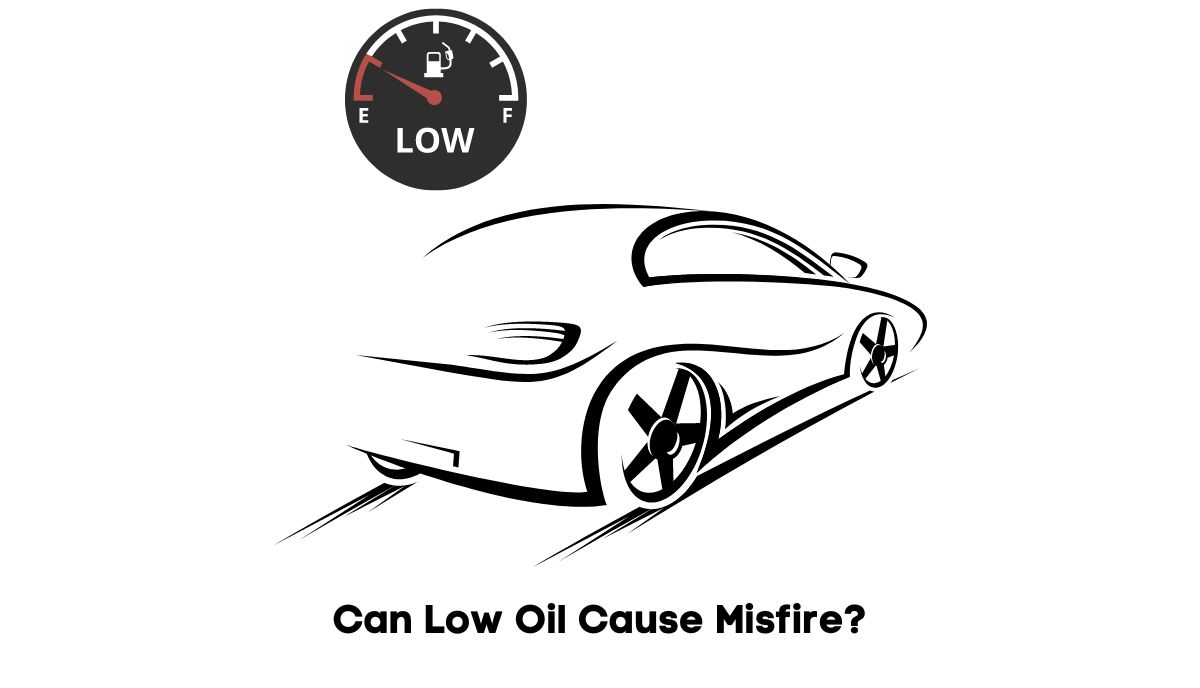Technically, low oil levels and engine misfires are unrelated. Oil lubricates the engine’s moving parts. Therefore, you should expect a lot of knocking and overheating when oil levels drop. Misfirers, on the other hand, occur when something disrupts the combustion process.
For example, Cars with variable valve timing have cam phasers. These components stand out because they use the engine speed and load to adjust the cam timing. They also require the correct oil pressure to perform their function. If low oil levels interfere with their work, the cam phasers will respond too early or too late. This will make the computer think that a misfire has occurred.
Excluding this scenario, low oil levels and pressure may cause misfires indirectly if one or more of the following occur:
- The RPM may drop dramatically because low oil pressure has depleted the fuel.
- A misfire may occur because the engine’s parts are worn out due to poor lubrication from low oil levels. This may explain the timing issues you’ve noticed in the combustion process.
- A reduction in oil pressure resulting from a damaged oil filter can lead to improper valve timing.
However, low oil levels shouldn’t be your first consideration when the engine misfires. Low oil levels and misfires tend to attract similar symptoms, such as a check engine light that won’t go off, intense vibrations, a sluggish engine, and increased fuel consumption. That said, these two issues are rarely associated with one another.
How To Resolve Misfires Caused By Low Oil?
Start by confirming that your vehicle has low oil levels. That means keeping an eye out for:
- The oil pressure warning light.
- The smell of burning oil.
- Strange sounds from under the hood.
- Weak performance from the engine.
- Overheating engine.
- Excess oil consumption.
- Sputtering engine.
- Black smoke.
Once you’ve confirmed that your vehicle has low oil levels, you can take the necessary steps to fix this issue:
- Change old oil. This will cost you $100 or less.
- If the oil has the wrong viscosity, change it. The manual will show you the correct viscosity rating.
- Replace an old or clogged oil filter. A new oil filter will cost you $25 to $80. Those figures may include an oil change.
- If the oil pump has failed, FIXD expects you to spend as much as $1,357 on a replacement.
- Inspect the lubrication system and fix any leaks you find. Sometimes, that means replacing damaged pipes and hoses.
- Once you fix the leak, add more oil.
- If you allow the low oil levels to persist for a while, you may require a mechanic to rebuild your engine. They will take it apart, scrutinizing each component individually until they locate and replace all the parts that failed when you ran out of oil and the metallic components rubbed against each other. This is a long and expensive process. You might be better off buying a new engine or a new car.
What Are 7 Other Causes Of Engine Misfires?
Do you know what happens when you turn the key in the ignition? The engine transitions through the following stages:
- Fuel injectors spray fuel into the combustion chamber.
- The air intake system pulls air into the combustion chamber.
- Air and fuel must enter the chamber in the correct quantities for complete combustion to occur. The ideal ratio for a gasoline engine is 14:7:1.
- The spark plugs generate a spark that ignites the air/fuel mixture.
- The resulting explosion pushes the piston into the cylinder.
- If all goes according to plan, the cylinders will move thousands of times each minute.
A misfire can occur if any one stage goes wrong, such as the mixture igniting too early, too late, or not at all. The vehicle will manifest one or more of the following symptoms when a misfire occurs:
- The check engine light will come on because the sensors have detected an anomaly in the combustion process.
- The engine will appear to hesitate and stall, especially when you accelerate.
- You may hear pinging or rattling from the engine when it’s under load.
- The engine will stall while it idles. It may also idle rougher than usual.
- The engine will misfire because one or more cylinders have stopped firing correctly. This unbalances the engine.
- The car may start with a bang because of a misfire originating from a bad piston.
- Some cars eject thick clouds of smoke from the exhaust because the air/fuel mixture doesn’t combust completely.
But why would a vehicle misfire? Why would the cylinder refuse to fire? The following are usually at fault:
1). The Spark Plugs Are Dead

Denso has spark plugs that last a whopping 100,000km. But yours may fail after 20,000 miles or less, depending on the conditions they encounter in your car. Some spark plugs fail altogether. Others develop thick deposits on the electrodes. You also have those that overheat, melt, and crack.
Regardless of the reason, bad spark plugs will cause a misfire because they can’t ignite the air/fuel mixture.
2). The Ignition Coils Are Bad

Faulty spark plugs are problematic because they create a weak spark. However, that weak spark can also originate from worn-out ignition wires. The check engine light tends to illuminate when the car detects a bad ignition coil. Expect stalling, rough acceleration, rough idling, and poor fuel economy.
3). The Air/Fuel Ratio Is Poor
You need the perfect quantity of fuel and air for combustion to occur without leaving any unburnt fuel. The engine can misfire because of an imbalance in this ratio.
This imbalance should concern you because it points to a defective fuel pump and a clogged or damaged filter. You should also inspect the intake gasket and EGR valve.
4). The Fuel Injectors Are Clogged

Clogged fuel injectors can interfere with the engine’s work. If you’ve cleaned the injectors but the symptoms have persisted, find the connectors attached to the back of the fuel injectors. Disconnect each connector while observing the engine’s response. This will highlight the fuel injector with the fault.
A fuel injector can fail because of an electrical issue. Use a test light to investigate the power flowing to each injector.
5). The Fuel Filter is Dirty

A dirty filter reduces fuel pressure, which, in turn, lowers the quantity of fuel flowing into the combustion chamber, leading to a cylinder misfire.
6). The Catalytic Converter Is Clogged

Laypeople don’t expect a malfunction in the catalytic converter to affect the engine. After all, it is primarily concerned with reducing the car’s emissions. However, a faulty catalytic converter can contribute to an engine’s misfires when it clogs because the pressure in the exhaust system builds.
This prevents the exhaust gases in the combustion chamber from escaping. A technician must troubleshoot the situation to determine whether or not you require a new catalytic converter.
7). The Computer Has A Glitch
The computer matters because it manages the combustion process. That includes adjusting the air/fuel mixture. Therefore, a glitchy computer can cause a misfire by sending false signals. This can occur because the computer received the wrong information from faulty sensors.

